
Dr. Avraham Reichenberg (Left) with Dr. Arora (Right)
P30 Center Members, Drs. Reichenberg and Arora, research “Fetal and postnatal metal dysregulation in Autism” was highlighted by NIEHS’s Environemental Factor. Baby teeth from children with autism contain more toxic lead and less of the essential nutrients zinc and manganese than baby teeth from children without autism, according to Drs. Reichenberg’s and Arora’s study. The findings, published June 1 in Nature Communications, suggest that differences in early-life exposure to metals, and more importantly, how a child’s body processes them, may affect the risk of autism. “Autism is a condition in which both genes and environment play a role, but figuring out which environmental exposures may increase risk has been difficult,” said lead researcher Manish Arora, Ph.D., an environmental scientist and dentist at the Icahn School of Medicine at Mount Sinai. “Some scientists have proposed that events before we are born may increase our risk of autism, but what is needed is a window into our fetal life — which baby teeth provide,” he added. Dr. Arora and his colleagues developed and validated this innovative use of baby teeth with NIEHS support. They previously showed that the amount of lead in dentine formed around the time of birth was strongly correlated with lead levels in umbilical cord blood. To read the full story click here.
